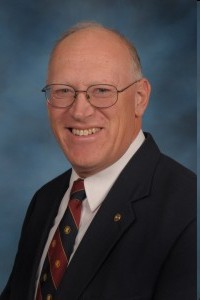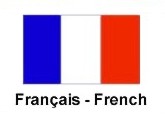Now That�s Rural: Morganville, Kan., to Feves, France
What can you and I do to promote world peace? That may sound like a question in the Miss America pageant, but today
we�ll learn about a rural Kansas community which took specific action to help a war-torn community halfway around
the globe. That initiative began more than a half-century ago, and the relationship is being renewed again.
Brent and Charlotte Rundell live at Morganville, Kansas. They met at K-State and he went to work for a grain
business in Morganville. While eating at the Morganville Cafe, he noticed a wooden picture carving with the words
Feves & Morganville inscribed on the bottom. Older friends in his Bible study explained that it came from the time
when Morganville adopted a city in France.
After World War II, a Methodist minister in Morganville encouraged the town to reach out to those in need overseas.
The citizens of Morganville decided to adopt a European community which had been severely damaged by the war. A
local woman named Velma Carson took up the cause.
In 1948, a vote of the citizens was conducted. The community they chose was Feves, France. There was no prior
personal connection between the towns, but there was definitely a need.
Feves was a small wine-growing community in northern France, close to the German border. During World War II, an
estimated 75 percent of the community was destroyed. Feves schoolmaster Henri Torlotting sent word that the
children were literally without cereals or milk. Back in Kansas, the citizens of Morganville wanted to lend a hand
but needed resources to help. They decided to raise funds by putting on a pageant.
Velma Carson, the local volunteer, took on the task of writing a pageant which celebrated world peace. On Aug. 27,
1948, the pageant was performed in Morganville.
The original target called for 30 people to be involved in the performance, but by the end, nearly 150 people were
involved. Rather than pay admission, people were invited to donate, and more than $1,000 was raised in this manner.
Two cases of donated clothing and three barrels of powdered milk were part of the first shipment to Feves, and much
more followed. Schoolmaster Torlotting helped distribute the aid.
Ultimately, the city of Feves recovered and sent its thanks back to Kansas. One of its gifts was the wooden picture
carving that Brent Rundell saw decades later.
This voluntary action to help people overseas was so inspiring that it was featured on a national radio broadcast
and then in a book published in 1955. But as the decades passed, the story was essentially forgotten.
In 2013, K-State journalism instructor Gloria Freeland assigned her students to write histories of rural
communities in Clay County, Kansas. Cathy Haney, curator of the Clay County Museum, helped Gloria�s students find
information about the Morganville-Feves connection. It caught the eye of Freeland and her husband, Art Vaughan. He
created a website at www.morganvillefeves.org to share the remarkable story.
The story�s publication rekindled the relationship between Morganville and Feves. In December 2013, Morganville
hosted visitors from Feves: Gerard and Solange Torlotting, now in their 70s, who had been children when the aid
arrived from Morganville. Gerard�s uncle was the very same schoolmaster who had helped distribute the aid in Feves.
Gloria Freeland and her family visited Feves six months after the Torlottings visited Kansas and again two years
later. In fall 2015, 20 citizens from Feves came to Morganville. Brent and Charlotte Rundell, now the mayor and
first lady of Morganville, hosted their international guests.
�It�s pretty special,� Brent said.
How remarkable that this international initiative would begin in a rural community like Morganville, population 197
people. Now, that�s rural.
What can you and I do to promote world peace? Maybe we can reach out to help those who have suffered from war. We
commend Brent and Charlotte Rundell, Gloria Freeland and Art Vaughan, Cathy Haney, and all those who are making a
difference by revitalizing this international relationship. As Velma Carson said at the time, �This was the one
affirmative thing for peace that we�d been looking for.�

Ron Wilson is director of the Huck Boyd National Institute for Rural Development at Kansas State University.
Ron Wilson

